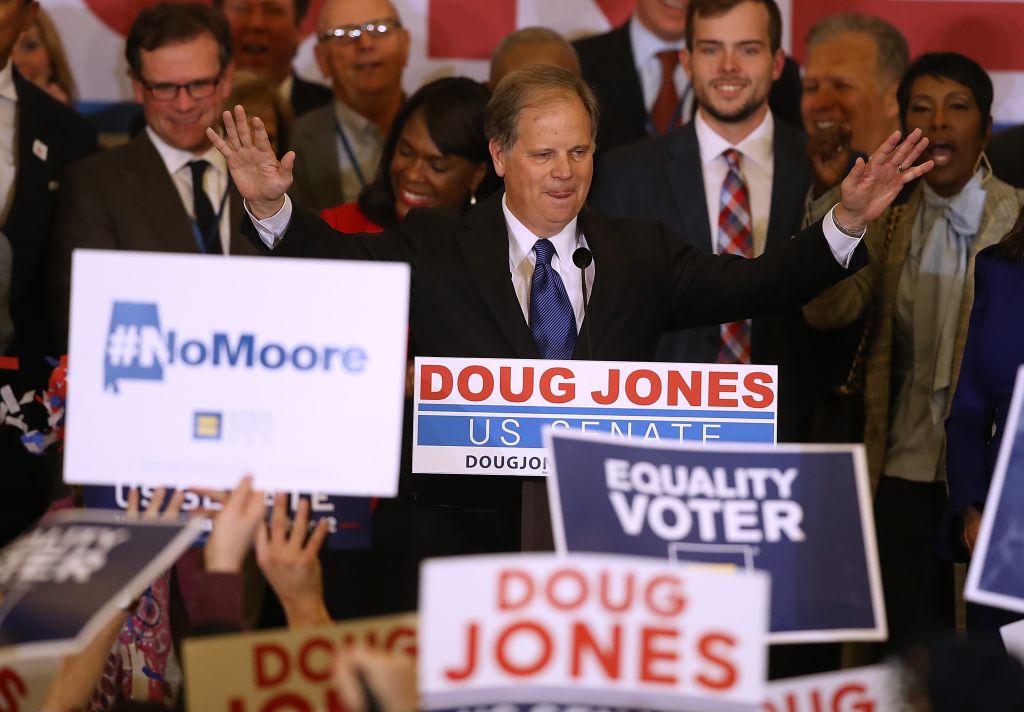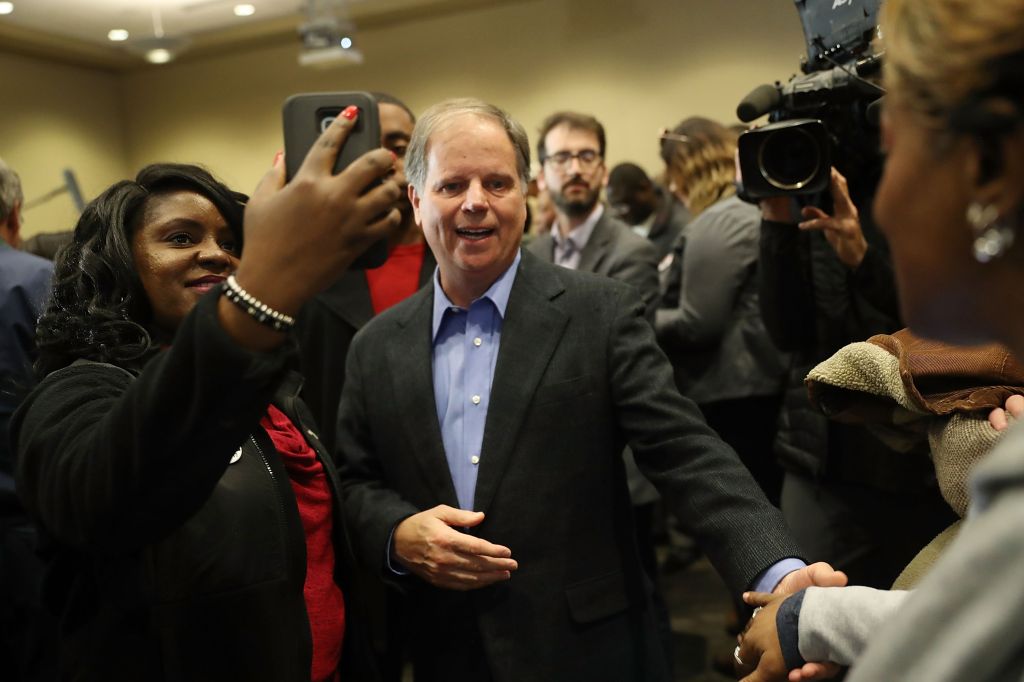
Source: Justin Sullivan / Getty
L ast night in Alabama, Doug Jones defeated Roy Moore to become the first Democrat in the state to win a Senate seat in 25 years. In the months leading up to the election, the media portrayed the contest as a defining moment for America, one that would test the bounds of voters’ sense of morality. Now that Jones has defeated Moore, there is thought that both the Republican and Democratic parties are due for a shift on which issues matter most to voters.
As an alleged sexual predator, pedophile, and self-described Christian evangelist, Moore’s candidacy encouraged the nation to question the fundamental morality of both major political parties. The controversy surrounding Moore’s alleged actions put a spotlight on the #MeToo movement and prompted calls for Senator Al Franken (D-Minn.) and Congressman John Conyers (D-Mich.) to resign. But opposing sentiment came from political leaders and correspondents alike, as some Democrats thought it would be better for a ideologically-progressive elected official to stay in office despite professional and personal offenses against women if it meant upholding the possibility for political prosperity.
The Republican party seemed to struggle equally. When details of Moore’s predatory actions first gained public attention, Senate Majority Leader Mitch Mcconnell and other members of the GOP called for him to drop out of the race. But in an effort to pass a hotly debated tax plan, McConnell and other republicans reinstated their support of Moore three weeks before election day. Moore also received an unwavering endorsement from President Donald Trump, who is facing his own allegations of sexual misconduct.
But the results of last night’s election—where many white Alabamians voted for an alleged sexual predator and racist over criminal justice reformer and anti-racist Doug Jones—showed that Black Americans were considerably more decisive on the issue. Exit polls found that 96 percent of Black voters selected Jones on the ballot. As stories in the New York Times and USA Today this morning detail the significant contribution of Black voters, they also suggest that Black voters value consistency between political ideology and action more than their white counterparts.
Another article posted today by Vann R. Newkirk II of The Atlantic was titled, “African American Voters Made Doug Jones a U.S. Senator in Alabama.” In the piece, Newkirk reviews multiple media outlets and their coverage of Black folks in Alabama, including The Washington Post. He uncovers a biased narrative that claimed Black voters were unaware, apathetic, and lacked “energy” in regards to the political race. These same outlets also failed to adequately discuss the extreme actions Alabama Republicans had undertaken to suppress Black votes. For example, in 2011 the state of Alabama passed a voter ID law targeting communities of color and employed a range of other tactics to prevent Blacks from voting.
With his win, Doug Jones should now be responsible for shifting the Democratic party in a way that prioritizes healing Black communities from centuries of racial trauma and systematic oppression and unites the progressive ideology of Black Americans with the priorities of their white counterparts.
Given these injustices and the systematic oppression Black people have endured, I discussed ahead of the election how Black people are not responsible for Doug Jones’s win. Instead, white people, as the majority of the state’s citizenry, should take responsibility for upholding democratic principles. Black Americans should have the right to attend to their most critical needs before responding to promised ideals. But Black folks—despite legal barriers and public shaming by media outlets—were still able to advance a progressive candidate in Alabama Tuesday. As Newkirk wrote, “These results demolish the pre-established media narrative about Black voters in the state, and defy conventional wisdom. Black voters were informed and mobilized to go vote, and did so even in the face of significant barriers.”
This morning, Samuel Sinyangwe, activist and co-founder of Campaign Zero tweeted, “If Black people had voted 68 percent for a pedophile last night, the media would be spending all day questioning the moral character of Black families and communities.” Given the negative coverage of Black Alabama throughout the Senate race, I would suggest that he is correct. Moreover, given the choices placed before voters in this election, it may be time for political party leadership and the media to truly investigate the choices Americans make at the polls and what matters most to them.
With his win, Doug Jones should now be responsible for shifting the Democratic party in a way that prioritizes healing Black communities from centuries of racial trauma and systematic oppression and unites the progressive ideology of Black Americans with the priorities of their white counterparts. Here are three things the Doug Jones can do to advance Black America now that he is joining the Senate:

Source: Joe Raedle / Getty
Uphold the Needs of Black Women
Earlier this month, NPR covered the prevalence of sexual abuse against Black women and our nation’s tendancy to ignore it. In the piece, Karen Attiah writes, “So, women of color who already have harder barriers in [white collar professional circles], I think we absolutely do need to pay more attention to their stories, and part of that will be for us to start listening and to start taking women of color seriously.”
A USA Today article reviewed Twitter’s hashtag #BlackWomen celebrating the CNN exit poll, which showed that 98 percent of Black women voted for Jones. He has the responsibility to recognize Black women as a voting bloc, uplift the issues that impact them through the passage of federal policy, and become an ally for them in the $MeToo movement.
Acknowledge and Address Racial Inequity
Jones’s career includes prosecuting domestic terrorists that targeted Black communities. Now, his work must address ways to heal and restore Black communities. Despite deep disparities in income, treatment under the law, and quality of life, Black voters showed up at the polls for the Democratic party via Jones. This is a trend that has persisted for decades with very few sustainable rewards for the Black community. It is now Jones’ responsibility to lead a national debate that acknowledges systematic injustice against Blacks and works to correct such injustice.
Promote a Unifying Progressive Agenda on the Federal level
Since the election of Trump, political pundits have discussed politics in terms of morals and race without discussing the historical and pervasive issues that segregate white voters from issues that actually impact them. In fact, a Vox survey of poor white people showed that their situations made them more likely to vote for Hillary Clinton, but that they chose not to based on white supremacist notions.
This election further indicates that the political beliefs and actions of white voters in Alabama and beyond are not aligned with an agenda that will address sexual misconduct, racial inequity, or economic disparity. But these issues have the potential to move the country forward if they are tackled with intention. Jones should take the burden of lifting democratic ideals off the backs of Black people and encourage white folks to share the load.
Given what is at stake for Black people and poor and middle class whites, it is time for politicians like Jones to change the conversation from one of political party loyalty to one that addresses the actual needs of the citizenry—starting with zero tolerance for racism, xenophobia, and sexual misconduct.
Bryan Epps, a Newark native, is an innovative community and institution builder.
















